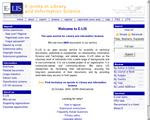During Open Access Week, I posted on
open access repositories and on
options for authors who wish to archive eprints of their scholarly journal articles. Both posts were intended to encourage forced migration researchers to more regularly deposit their research output in either institutional or disciplinary repositories. However, since I have never actually archived anything myself, I thought I should try it out and report back in order to be able to say "I know whereof I speak."
For my first experience, I decided to deposit a journal article eprint. The article in question is entitled "Using a wiki to publish a research guide," and it was published in Emerald's
Library Hi Tech News.
Step one: Confirm publisher's self-archiving policy.
When depositing article eprints, the first thing to check is the publisher's policy re. self-archiving. Generally, this information is available on the publisher's web site. For example, Emerald has a page called the
Authors' Charter, which spells out copyright principles and author rights. Alternatively, you can search in the
RoMEO database for a synopsis of publisher self-archiving policies. Here is the
entry for the specific journal title: It allows author pre-prints (i.e., pre-refereeing) and author post-prints (i.e., final draft post-refereeing), as long as the published source is acknowledged and a link is provided to the publisher version.
I only had a pre-print version of my article, or the copy that I originally submitted to the editor for review. I did not have an official post-print since any editorial changes required were made in-house and were only circulated to me for review.
Step two: Select a repository.
The next thing to do is choose an appropriate repository. Academic authors affiliated with an institution should first check to see if their institution has its own repository. They can do that by searching in the
openDOAR Directory of Open Access Repositories. However, since I work independently, this was not an option for me. I decided instead to go with a disciplinary repository. I am an information specialist, and the OAD's
listing of disciplinary repositories includes a section for "library and information science." By default, I chose
E-LIS since the other alternative was not accessible at the time of this writing! E-LIS also happens to be "a free-access international archive, in line with the Free Online Scholarship (FOS) movement and the Eprints movement, based on the Open Archive Initiative (OAI) standards and protocols."
Step three: Prepare for the submission process.I reviewed the
submission guidelines prior to registering in order to be properly prepared. E-LIS requires that submitted documents be provided in HTML or PDF format. Since my article was prepared in Microsoft Word, I took a few minutes to convert it to an acceptable format. I did this by copying the text of the article to
Google Docs, since I knew I could then download the document as a PDF file. Since images cannot be copied and pasted, I also took some time re-inserting two screenshots into the Google Doc version. All in all, this process probably took about 15 minutes.
Step four: Register with the repository.Next, I proceeded with the registration process. This simply involves signing up with an email address, a user name and a password. An automated confirmation message was sent to the address I provided, and once I activated the account, I was ready to continue.
Step five: Deposit your document.
Once I logged into E-LIS, I was presented with the option of uploading a new item or editing an existing one. I selected the former, and proceeded to a page with straightforward instructions about the kind of information I needed to provide (type of document, title, location elsewhere online, abstract, keywords, subject terms, etc.). Once I completed the necessary fields, I moved on to actually uploading the document. E-LIS offers the option to embargo a document, i.e., to make it available at a later date to accommodate publishers who place restrictions on when a post-print can be deposited (e.g., 12 months after it has been published). It also includes a utility that will convert a document to PDF for you, if you were not able to do so yourself. Once the uploading process was complete, I could revisit all the details I provided. I was also notified that the document will become available subsequent to a review by an editor. All-in-all, the process took about 15 minutes.
So now I can attest to the fact that depositing a journal article eprint to a disciplinary repository is a relatively painless endeavor! And a day later,
here is the document.
Tagged Publications and Web Sites/Tools.
 Upcoming Events and Opportunities:
Upcoming Events and Opportunities:
















